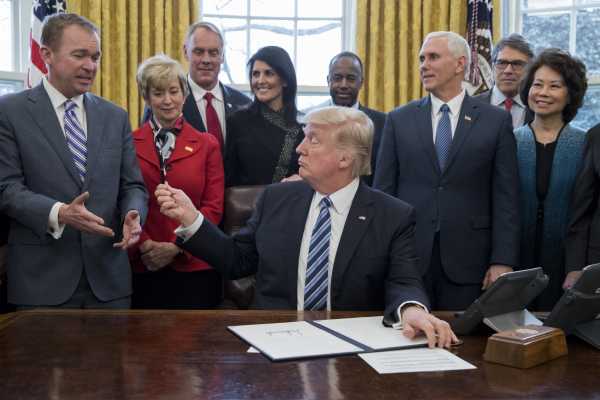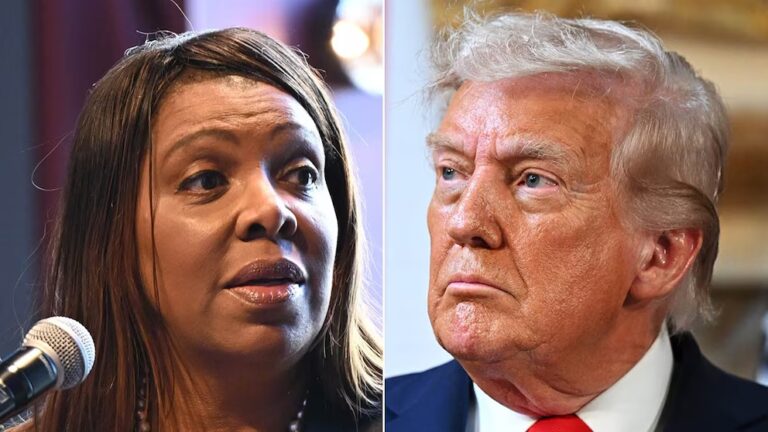
On Wednesday evening, President Donald Trump traveled to North Carolina to arouse the faithful by reiterating his racist crusade of the moment — a campaign to drive Rep. Ilhan Omar out of the country and back to Somalia, a country she left when she was 6 years old.
The rally was disgusting and shocking, but not surprising to those who’d read the weekend volley of racist tweets that initiated this particular news cycle nor to those who recall the 2016 campaign’s Muslim ban, the blood libels about “the caravan” that stalked the 2018 midterms, or anything else from Trump’s long and sordid history of racial demagoguery.
But if you want to really understand American politics in the summer of 2019, it makes sense to tune out the carnival barker’s antics for a moment and consider a plaintive memo issued earlier on Wednesday by Wachtell, Lipton, Rosen, and Katz — one of America’s top business law firms.
The memo made the case to clients that Wachtell’s expertise in regulatory compliance and white-collar defense is still important, even though many buyers of legal services may be inclined to think that rich companies don’t much need lawyers anymore. That’s because under Trump there’s been a “significant drop over the past two years in both the number of white-collar prosecutions and the scale of corporate fines and penalties.”
Earlier this week, the White House formally stated its plan to veto Democrats’ proposed increase in the federal minimum wage. And the New York Times reported that Trump’s newly installed acting secretary of labor is expected to “push through a sweeping anti-union agenda and coordinate his actions with the president’s political team.”
It’s wrong to characterize the racist incitement as a “distraction” since it is important on its own terms. But it is worth understanding that there is a controversial aspect of the Trump administration that he is happy to talk about — the racist aspect — and then there is a whole other set of controversies lurking hidden below the water line that Trump doesn’t like to talk about.
In the fight Trump wants to have, he casts himself as a champion of the typical white American Christian who is beset by various alien forces and politically correct elites. But when you bring the entire iceberg into view, you see a version of Trump that is much more reflective of Trump’s entire business career — a scam artist who profits off the misplaced trust of his fans just as much as anything else.
The Trump Show and the Mulvaney administration
Politico reporter Tim Alberta’s new book American Carnage was released earlier this month and details what many are characterizing as Trump’s “takeover” of the GOP.
It’s an excellent book where Alberta uses the depth of his reporting to really bring the receipts and show the extent to which, until he beat Hillary Clinton, many of the people who are now his most loyal allies were deeply skeptical of his fitness for office.
“We’re not going to let Donald Trump dismantle the Bill of Rights,” Mick Mulvaney, a far-right House member from South Carolina told Alberta in 2016. “For five and half years, every time we got to the floor and try to push back against an overreaching president, we get accused of being partisan at best and racist at worst. When we do it against a Republican president, maybe people will see it was a principled objection in the first place.”
Today, Mulvaney is White House chief of staff, and people can clearly see that there never was a principled objection at all.
But what many people miss about this turnaround is it’s not a case of Trump over-awing or hypnotizing once-skeptical Republicans. What changed is that conservative movement leaders used to be afraid that Trump would be disloyal to their priorities.
They feared, in short, that his rhetorical gestures of economic populism — he promised a higher minimum wage, a big infrastructure bill, a universal health care plan, and even higher taxes on the rich — would be real. It turns out, however, that Trump was just lying about almost all of that stuff.
In exchange for deciding that he doesn’t care whether or not Trump shreds the bill of rights, Mulvaney now, according to an excellent team of Washington Post reporters, “has built what one senior administration official called ‘his own fiefdom’ centered on pushing conservative policies — while mostly steering clear of the Trump-related pitfalls that tripped up his predecessors by employing a ‘Let Trump be Trump’ ethos.”
Mulvaney stays away from the trade, national security, and immigration portfolios and in exchange has carte blanche to run the bulk of domestic policy for the administration — largely free of any kind of public scrutiny. And imbued with strong ideological convictions while encumbered by few constrains, he’s free to enact consequential and unpopular decisions on a strikingly broad range of topics — from overruling the Health and Human Services secretary’s ban the use of fetal tissue in medical research, to the looming anti-labor agenda at the Labor Department, to reviving a proposal to enact a gigantic tax cut for rich stock market investors through administrative fiat.
The upshot of Trump administration policymaking — beginning with Paul Ryan’s speakership, continuing under Mulvaney’s operation of the executive machinery now that Democrats run the House, and of course extending into the Federalist Society domination of the judiciary — is to completely neuter or dismantle the institutions of government that are supposed to check the ability of the wealthy and powerful to run roughshod over the rest of us. Polluters can pollute more, scamsters can scam more, bankers can go back to running the risks that blew up the global economy, and no legislation that would impair the privileges of the powerful can pass.
It’s not exactly that the Trump Show is fake and Mulvaney’s operation is the real government, but it’s impossible to understand why the Trump Show we see on stage works without appreciating what’s happening behind the scenes and who benefits from it.
American plutocrats have learned to love Trump
On Monday, Brian Schwartz of CNBC reported that “Trump, Republican National Committee turn to titans of industry to help raise over $100 million in second quarter.”
That massive haul of financial cash comes in part from people who backed Trump in 2016. But it also features big bundles of cash from donors who supported other GOP candidates in the 2016 primary and then stayed aloof from Trump. It includes people like Stephen Rosenberg, CEO of the real estate investment partnership Greystone. Rosenberg backed Hillary Clinton in 2016, but wrote a $360,600 check to the Trump reelection campaign — and I’m guessing it’s not because he appreciates the way Trump drives liberal elites wild with his blunt talk.
Trump’s signature tax bill didn’t pay for itself as promised or lead to a massive surge in business investment, but it did boost bank profits to record levels. And it spurred a massive series of stock buybacks that benefitted rich people who own lots of stock and corporate executives with stock-linked compensation packages. He’s approving a Sprint/T-Mobile merger that will raise cellphone plan prices for consumers, repealed net neutrality regulations, and in one of his first acts decided to allow internet service providers to sell private user data to advertising companies.
Under Trump, decades of steady progress on non-climate air pollution have finally been reversed, and his administration is hard at work writing new rules that would increase water pollution levels as well.
Beyond acts of formal deregulation, he’s scaled back on enforcement of existing laws so much that law firms seem to be panicking about the possibility that some clients won’t bother hiring them anymore.
This agenda, no less than Trump’s racism, is an absolute disaster for America’s immigrants and communities of color who are generally lower-income and more vulnerable to corporate abuses and pollution than more privileged people.
But critically, it is also an absolute disaster for the vast majority of white people. There are simply very few people who benefit from a combination of more pollution and less economic competition, and there’s no way for the tax cutting to balance that out unless you’re part of the tiny minority of the public that derives the majority of its income from stock ownership.
Trump’s politics of racial division are not particularly popular — his approval ratings are worse than those of any prior president at this point in his term except Jimmy Carter — but it’s still true that framing Trump as a symbol of white privilege is almost certainly more favorable to him than framing him as a person whose governance has concrete material implications for Americans of all ethnic backgrounds.
Democrats can’t live in the Trump Show
An anonymous House Democrat went to CNN’s Jake Tapper on Wednesday to complain that the Trump versus Squad narrative was preventing Democrats from talking about their more popular agenda of jobs and health care. This critique makes sense, but if you take it seriously, the people to emulate are the Squad members themselves. Rather than whining off the record to prominent journalists, they are actually out there talking about jobs and health care.
Rep. Ilhan Omar has born more of the brunt of Trump’s racism than anyone else, and while she’s certainly not going to ignore that reality, the main focus of her political activity is still initiatives that she believes will help people in concrete ways.
The biggest challenge that House Democrats face in focusing the dialogue on material issues is not the Squad at all, but moderate members whose objections are the reason legislative action on the minimum wage had been delayed so much.
Nonetheless, it’s promising that Democrats of all factions seem to broadly recognize that an electoral message of dwelling on symbolic racism is less promising than one that highlights concrete concerns. The larger challenge is to actually make that happen in the face of a media landscape that is heavily tilted in favor of the Trump Show. It’s much easier to play and replay clips of Trump saying something outrageous than to try to explain the details of a regulatory action.
And it’s easy for a dialogue on racism to swiftly descend into intramural sniping between liberals and leftists and NeverTrumpers about exactly who objected to what when and in the right ways. By contrast, virtually nobody is going to stand up and publicly defend the idea that it’s good that under Trump’s watch the air is becoming more toxic and that corporate criminals are getting off so easily that their lawyers may be facing unemployment.
But racism’s function in American politics has been in part to serve as a kind of scam. The Jim Crow South had the lowest living standards for white people of any American region alongside the even lower standards for African Americans. And Trump is nothing if not a connoisseur of cons and scams.
Sourse: vox.com






